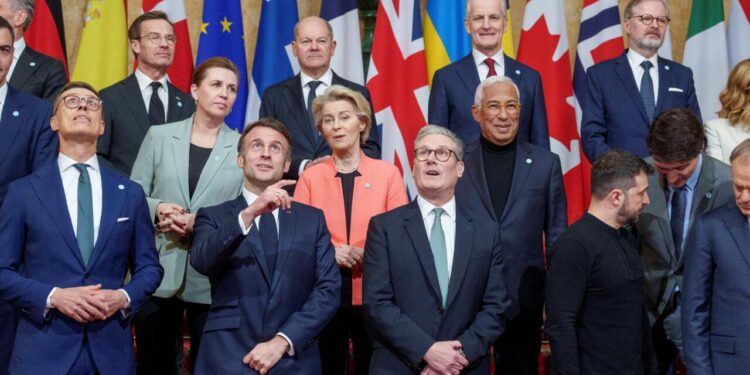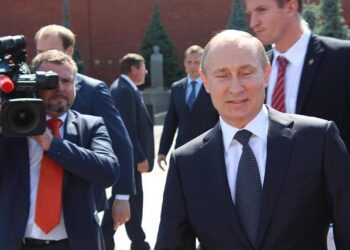European leaders have once again failed to reach a consensus on the latest package of sanctions targeting Russia, deepening divisions within the bloc as the conflict in Ukraine continues. The impasse emerged during high-stakes negotiations aimed at tightening economic and political pressure on Moscow, with disagreements over key measures stalling progress. As the European Union grapples with internal differences, the delay raises questions about its ability to present a united front amid an increasingly complex geopolitical landscape.
European Leaders Deadlock Over New Russian Sanctions Amid Growing Economic Concerns
As tensions with Russia continue to simmer, European leaders remain at an impasse over the introduction of a fresh round of sanctions. Despite mounting pressure from member states advocating for a tough stance, economic concerns linked to energy dependency and trade relations have fueled notable resistance within the bloc. Key issues include the potential impact on gas supplies during winter and fears of escalating inflation rates across vulnerable economies.
Points of contention highlighted by EU officials include:
- Impact of sanctions on energy imports, especially natural gas from Russia
- Risk of retaliatory measures affecting European industries
- Divergent economic priorities among Eastern and Western member states
- Balancing strategic security interests against short-term economic stability
| Country | Position on Sanctions | Economic Concerns |
|---|---|---|
| Germany | Cautious | High energy dependency |
| Poland | Supportive | Security risks from Russia |
| Italy | Hesitant | Rising inflation, trade impacts |
| France | Mixed | Balancing economy and diplomacy |
Diverging National Interests Stall Unified Response to Russia’s Aggression
Fractures within the European Union continue to weaken its ability to present a unified front against Russia’s recent military actions. Key member states have balked at the latest sanctions proposal, citing concerns over potential economic fallout and energy security risks. Countries heavily reliant on Russian gas supplies advocated for softer measures, while others pushed for a more robust crackdown targeting critical sectors like finance and technology. This divergence highlights the ongoing struggle to reconcile national priorities with collective responsibility amid escalating geopolitical tensions.
Points of contention include:
- Energy dependency: Eastern European countries demand stricter sanctions, while Southern Europe seeks exemptions to protect gas imports.
- Economic impact: Concerns over inflation and supply chain disruptions temper enthusiasm for aggressive trade restrictions.
- Political leverage: Some governments are wary of provoking retaliatory measures that could destabilize fragile domestic political landscapes.
| Country Group | Position on Sanctions | Key Concern |
|---|---|---|
| Eastern Europe | Strong support | Security & deterrence |
| Southern Europe | Moderate support | Energy supply risks |
| Western Europe | Divided | Economic stability |
Calls for Strategic Compromise and Coordinated Action Intensify Across EU Capitals
As the latest round of Russian sanctions stalled, voices from major EU capitals have grown increasingly urgent, urging for a strategic compromise to break the deadlock. Diplomats acknowledge the growing tension between maintaining a unified stance and addressing the concerns of member states disproportionately affected by energy dependencies. The complexity of aligning economic interests with political responsibilities has pushed leaders to consider flexible yet coordinated approaches moving forward.
Key demands from negotiators include a balanced framework that permits targeted sanctions without crippling essential supply chains. EU officials have proposed a tiered sanction system, aiming to balance punitive measures with practical allowances. Some capitals emphasize the need to protect vulnerable economies, while others call for a firm, unequivocal stance against Russian aggression. The ongoing discussions highlight the fragile equilibrium shaping the bloc’s foreign policy for the months ahead.
- Flexible sanctions to accommodate energy needs
- Economic impact assessments guiding policy decisions
- Enhanced coordination among EU foreign ministries
- Strategic compromises on sensitive trade issues
| Capital | Primary Concern | Status |
|---|---|---|
| Berlin | Energy security | Calls for flexibility |
| Paris | Unified sanctions stance | Strong support |
| Brussels | Policy coordination | Active mediator |
| Rome | Economic protection | Seeking balance |
Concluding Remarks
As negotiations on the latest sanctions package falter, European leaders face mounting pressure to present a unified front amid ongoing tensions with Russia. The impasse highlights the challenges of balancing diverse national interests within the EU while responding decisively to geopolitical threats. With no immediate resolution in sight, the coming weeks will be critical in determining whether Europe can bridge divisions and strengthen its collective response. The Guardian will continue to monitor developments closely.
















